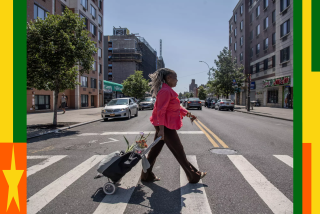Amid Hopes, Indian Premier Visits Pakistan
- Share via
ISLAMABAD — Indian Prime Minister Atal Behari Vajpayee received a warm welcome Saturday on his arrival in Pakistan for a regional summit seen as the best chance in years to get two old enemies talking again.
But Vajpayee kept his hosts guessing whether he would agree to bilateral discussions with either Pakistani Prime Minister Mir Zafarullah Khan Jamali or President Pervez Musharraf on the sidelines of the seven-nation South Asian Assn. for Regional Cooperation conference that begins today.
Jamali clasped Vajpayee’s hand tightly as both leaders smiled broadly for the cameras after the Indian prime minister, who is 78 and has a leg ailment, walked haltingly from an Indian air force passenger jet and past a Pakistani honor guard.
Pakistani officials say Jamali and Musharraf both want to talk with Vajpayee about bilateral issues outside the summit here in the capital. But Vajpayee’s aides remained uncommitted on the eve of the conference.
Pakistani Foreign Minister Mian Khursheed Mehmood Kasuri said that he did not know of any agreement by Vajpayee to hold talks with Musharraf or Jamali during the prime minister’s visit.
“It takes two to tango,” Kasuri told reporters Saturday evening. “If you need peace in South Asia, you need a peace partner. Pakistan is ready, but we need a partner, and that partner can only appear on the scene when we start talking and have a dialogue.”
Before leaving New Delhi, Vajpayee told an Indian television interviewer that he would not have any bilateral talks with Pakistani leaders.
“We want to give our undivided attention and energy to the success” of the summit, Vajpayee said. “Its success will help the resolution of other problems.” The conference agenda focuses on free trade and counter-terrorism.
Vajpayee told an Indian magazine that he would “interact” with his hosts, but he ruled out any “meaningful discussions.”
The Indian prime minister is expected to meet either Musharraf or Jamali, or both, at an informal gathering of the leaders of the South Asian association member countries, which include Bangladesh, Bhutan, Nepal, Sri Lanka and the Maldives.
Although Pakistani and Indian leaders may do nothing more than exchange pleasantries, any meeting could provide an opening for discussions on how to move toward formal negotiations.
Musharraf and Vajpayee last held direct talks at a 2001 summit in the Indian city of Agra, near the Taj Mahal. Their foreign ministers had agreed to a communique, which was expected to bring about formal peace talks, but the summit collapsed without agreement at the last minute.
Vajpayee left Agra feeling cheated by Musharraf, whose aides accused Vajpayee’s hard-line deputy prime minister, Lal Krishna Advani, of scuttling any chances of a deal.
Islamabad summit watchers searching for clues of Vajpayee’s intentions point to the early arrival of his most trusted aide, national security advisor and principal secretary Brajesh Mishra, as a sign that a breakthrough in relations is possible.
Mishra, who normally travels with Vajpayee on foreign trips, arrived in Islamabad two days before the prime minister. Local reports quoting anonymous sources said Mishra had used the extra time to meet with Pakistani officials, including the head of the military’s powerful Inter-Service Intelligence agency.
India and Pakistan have fought three wars, and countless border skirmishes, since they gained independence from Britain in 1947. The nuclear-armed neighbors almost went to war again following a December 2001 terrorist attack on India’s Parliament complex that left 14 people dead, including the five attackers. India accused Pakistan of masterminding the assault, which Pakistan denied.
After massing about 1 million troops on their border and the front line dividing the disputed state of Jammu and Kashmir, both sides pulled back from the brink, largely under pressure from Washington.
Last month, Vajpayee accepted Jamali’s offer of a cease-fire between conventional forces, but Indian authorities say militants continue to cross the Line of Control dividing Kashmir despite Musharraf’s repeated promises that Pakistan would no longer be a base for insurgents to attack its neighbor.
Kasuri, the Pakistani foreign minister, turned aside reporters’ questions on how the Islamabad summit’s agreement to combat terrorism would affect what most Pakistanis see as a “freedom struggle” by militants in Indian-controlled Jammu and Kashmir.
The South Asian association’s agreement simply updates a 1987 regional accord on measures to fight terrorism to bring it in line with a tougher United Nations resolution adopted after the Sept. 11 terrorist strikes on the United States, Kasuri said.
Any progress on the dispute over Kashmir depends on the government of India, the Pakistani foreign minister insisted. Asked if he was optimistic that long-awaited talks would start in Islamabad, Kasuri replied: “As far as Pakistani-Indian relations are concerned, optimism is about the only thing that I suppose we can rely on.”
More to Read
Sign up for Essential California
The most important California stories and recommendations in your inbox every morning.
You may occasionally receive promotional content from the Los Angeles Times.













